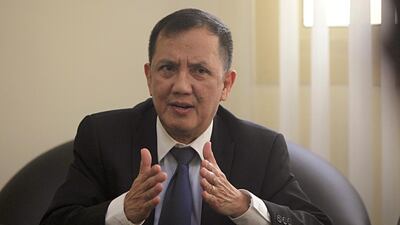ABU DHABI // When Filipino expatriates begin to vote in their country’s national elections this weekend, they say they will choose leaders who focus on providing jobs back home so they are not forced to work overseas.
Voting will take place from Saturday until May 9 the day of the national elections in the Philippines, at the embassy in Abu Dhabi and consulate in Dubai.
“Our leaders should strive to ensure we have good jobs back home so there will no longer be an exodus of Filipinos seeking overseas employment,” said Nhel Morona, 47, an IT administrator who has lived in Dubai for 20 years. “They should also focus on the agricultural sector, peace and order, and strengthening the economy.”
There are 72,437 voters in Abu Dhabi and 123,185 voters in Dubai and the Northern Emirates who are eligible to vote at the embassy or consulate. There are also 224 seafarers who signed up as overseas absentee voters in Abu Dhabi, and 768 in Dubai.
“We’ve got six vote counting machines and are aiming for a high voter turnout,” said Constancio Vingno Jr, the Philippine ambassador to the UAE.
“From the turnout, you can gauge how politically mature our citizens are. We should all have some interest in the electoral process. After all, we will be choosing people who will run our country.”
Mr Vingno hoped the number of registered voters would translate into actual votes.
Last week, the embassy requested that the Ministry of Foreign Affairs to allow them to conduct mobile voting in Ruwais, Al Ain and some churches to encourage more Filipinos to vote.
“Filipino citizens have a vital role to play in shaping our nation’s future, ” Mr Vingno said. “It’s high time that they exercise their right to vote and make their views known on issues that affect them and their families back home.”
Overseas voter registration for the national elections began on May 6, 2014 and ended on October 31, 2015.
Federico Agaton, 27, forgot to register to vote but still was interested in the outcome of the election.
“I hope whoever wins will address the problem of abused housemaids and provide jobs so they will no longer have to leave our country,” said Mr Agaton, who has worked in Abu Dhabi for three years.
The 2016 elections will be the fifth since Filipinos living overseas were first granted voting rights in 2004.
Filipinos who are at least 18 years old can vote for a president, vice president, 12 senators and a party-list representative, which represents certain sectors.
There are five presidential candidates vying to replace Benigno ‘Noynoy’ Aquino, who has been in power since 2010. They are Manuel Roxas II, Jejomar Binay, Grace Poe, Rodrigo Duterte, and Miriam Defensor Santiago.
Voting at the embassy will start on April 9 from 8am to 4pm; on April 10 to May 8 from 9am to 5pm, and on May 9, from 5am to 1pm.
rruiz@thenational.ae

